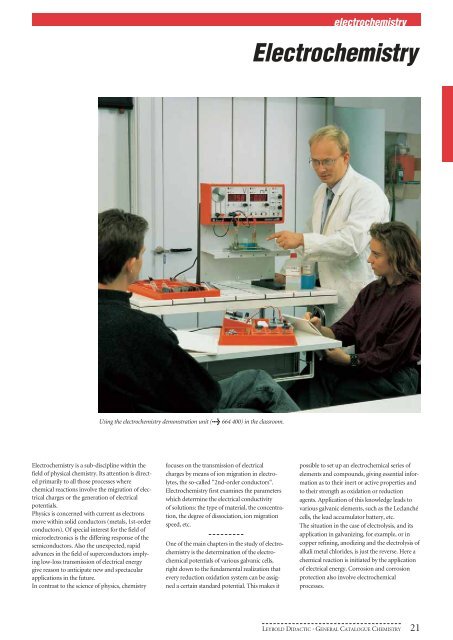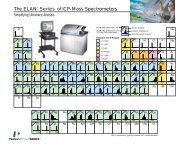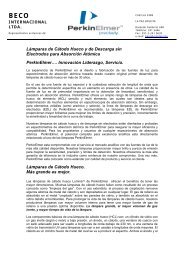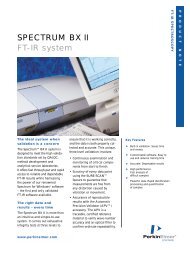- Page 1 and 2: General Catalogue Chemistry
- Page 3 and 4: ® Firmly focused on customer satis
- Page 5 and 6: Getting in touch with us… iv LEYB
- Page 7 and 8: Have a question? Feel free to call
- Page 9 and 10: ecology Ecology Leybold-Didactic pr
- Page 11 and 12: ecology All-purpose hand-held instr
- Page 13 and 14: ecology 666 225 Hand-held photomete
- Page 15 and 16: ecology 666 231 Sound level meter F
- Page 17 and 18: ecology Environmental testing 666 3
- Page 19 and 20: ecology 666 327 666 328 668 311 Eva
- Page 21 and 22: ecology Air pollution and waste gas
- Page 23 and 24: ecology Meteorology With the new ra
- Page 25 and 26: ecology 667 917 667 922 Digital fie
- Page 27: ecology Manuals Ecology 668 332 The
- Page 31 and 32: electrochemistry Practical experime
- Page 33 and 34: electrochemistry Conductivity 591 5
- Page 35 and 36: electrochemistry Fused-salt electro
- Page 37 and 38: electrochemistry Equipment list Hyd
- Page 39 and 40: electrochemistry 667 401 PEM fuel c
- Page 41 and 42: electrochemistry Fuel cells and alt
- Page 43 and 44: electrochemistry 666 479 CPS-metal
- Page 45 and 46: electrochemistry Alternative energi
- Page 47 and 48: electrochemistry Electrodes Electro
- Page 49 and 50: electrochemistry Literature Sample
- Page 51 and 52: electrochemistry 667 550 Experiment
- Page 53 and 54: chromatography Thin-film chromatogr
- Page 55 and 56: chromatography HPLC in Education an
- Page 57 and 58: chromatography 665 4801 524 010 Sen
- Page 59 and 60: chromatography Gas chromatography m
- Page 61 and 62: chromatography 665 531 Two-column g
- Page 63 and 64: chromatography Peak assignment and
- Page 65 and 66: photometry Spectrophotometer 667 34
- Page 67 and 68: 667 349 photometry Determination of
- Page 69 and 70: analysis methods Optical activity M
- Page 71 and 72: analysis methods Viscosity 64 LEYBO
- Page 73 and 74: analysis methods Electrophoresis Th
- Page 75 and 76: analysis methods Calorimetry Determ
- Page 77 and 78: analysis methods 667 325 Calorimete
- Page 79 and 80:
analysis methods CPS experiment ass
- Page 81 and 82:
analysis methods Butane gas analysi
- Page 83 and 84:
chemical engineering/applied chemis
- Page 85 and 86:
chemical engineering NEW Extraction
- Page 87 and 88:
chemical engineering/applied chemis
- Page 89 and 90:
chemistry panel system Basic assemb
- Page 91 and 92:
chemistry panel system Writing fiel
- Page 93 and 94:
chemistry panel system Storage Cabi
- Page 95 and 96:
chemistry panel system CPS-experime
- Page 97 and 98:
chemistry panel system Organic chem
- Page 99 and 100:
chemistry panel system Technical ch
- Page 101 and 102:
chemistry panel system Physical che
- Page 103 and 104:
chemistry panel system Analytical c
- Page 105 and 106:
chemistry panel system CPS measurin
- Page 107 and 108:
chemistry panel system CPS-Measurin
- Page 109 and 110:
chemistry panel system CPS full-sys
- Page 111 and 112:
chemistry panel system 666 432 CPS-
- Page 113 and 114:
chemistry panel system Laws of gase
- Page 115 and 116:
chemistry panel system Liquid pumps
- Page 117 and 118:
chemistry panel system Power suppli
- Page 119 and 120:
chemistry panel system CPS-blank pa
- Page 121 and 122:
iotechnology Batch reactor Biologic
- Page 123 and 124:
iotechnology Equipment list Microbi
- Page 125 and 126:
biotechnology 666 420 Peristaltic p
- Page 127 and 128:
iotechnology Biochemistry Equipment
- Page 129 and 130:
iotechnology Tools for biochemistry
- Page 131 and 132:
special topics 667 199 Dialysis tub
- Page 133 and 134:
special topics Equipment list Produ
- Page 135 and 136:
stm Equipment storage There are two
- Page 137 and 138:
illustrative media Overview of the
- Page 139 and 140:
illustrative media Overview of the
- Page 141 and 142:
illustrative media Molecular models
- Page 143 and 144:
illustrative media Orbital models O
- Page 145 and 146:
illustrative media 667 678 Periodic
- Page 147 and 148:
illustrative media 140 LEYBOLD DIDA
- Page 149 and 150:
illustrative media Chemistry manual
- Page 151 and 152:
computer-assisted experimenting Bri
- Page 153 and 154:
computer-assisted experimenting Sen
- Page 155 and 156:
computer-assisted experimenting 148
- Page 157 and 158:
computer-assisted experimenting Sen
- Page 159 and 160:
computer-assisted experimenting Sen
- Page 161 and 162:
computer-assisted experimenting Sen
- Page 163 and 164:
computer-assisted experimenting Sen
- Page 165 and 166:
computer-assisted experimenting Sen
- Page 167 and 168:
computer-assisted experimenting Ord
- Page 169 and 170:
computer-assisted experimenting Spe
- Page 171 and 172:
measuring equipment - length Instru
- Page 173 and 174:
measuring equipment - time 666 095
- Page 175 and 176:
measuring equipment - mass 315 25 3
- Page 177 and 178:
measuring equipment - mass Sartoriu
- Page 179 and 180:
measuring equipment - mass Accessor
- Page 181 and 182:
measuring equipment - mass Mettler
- Page 183 and 184:
measuring equipment - electricity D
- Page 185 and 186:
Digital multimeter 667 908 666 453
- Page 187 and 188:
measuring equipment - electricity B
- Page 189 and 190:
measuring equipment - electricity 5
- Page 191 and 192:
measuring equipment - electricity F
- Page 193 and 194:
measuring equipment - electricity 5
- Page 195 and 196:
measuring equipment - recorders Cha
- Page 197 and 198:
measuring equipment - pulses, frequ
- Page 199 and 200:
measuring equipment - temperature 6
- Page 201 and 202:
measuring equipment - temperature T
- Page 203 and 204:
measuring equipment- pH pH meters a
- Page 205 and 206:
measuring equipment- pH Inserting t
- Page 207 and 208:
measuring equipment - conductivity
- Page 209 and 210:
energy supply Batteries, accumulato
- Page 211 and 212:
energy supply Variable extra-low vo
- Page 213 and 214:
energy supply 52129 Three-phase ext
- Page 215 and 216:
energy supply 521 50 AC/DC power su
- Page 217 and 218:
energy supply 210 LEYBOLD DIDACTIC
- Page 219 and 220:
auxiliary equipment · electricity
- Page 221 and 222:
auxiliary equipment · electricity
- Page 223 and 224:
auxiliary equipment · electricity
- Page 225 and 226:
stand material Stand bases 300 01 S
- Page 227 and 228:
stand material Stand rods Stand rod
- Page 229 and 230:
stand material Stands Bunsen burner
- Page 231 and 232:
heaters and stirrers Burners and ac
- Page 233 and 234:
heaters and stirrers Electrical hea
- Page 235 and 236:
heaters and stirrers 303 25 Safety
- Page 237 and 238:
heaters and stirrers 666 766 Circul
- Page 239 and 240:
heaters and stirrers 666 847 Magnet
- Page 241 and 242:
heaters and stirrers Desalinization
- Page 243 and 244:
heaters and stirrers 666 861 Hand-d
- Page 245 and 246:
Beaker glass, plastic and porcelain
- Page 247 and 248:
glass, plastic and porcelain ware T
- Page 249 and 250:
glass, plastic and porcelain ware C
- Page 251 and 252:
glass, plastic and porcelain ware G
- Page 253 and 254:
glass, plastic and porcelain ware V
- Page 255 and 256:
glass, plastic and porcelain ware B
- Page 257 and 258:
Funnel glass, plastic and porcelain
- Page 259 and 260:
glass, plastic and porcelain ware D
- Page 261 and 262:
glass, plastic and porcelain ware S
- Page 263 and 264:
glass, plastic and porcelain ware 6
- Page 265 and 266:
glass, plastic and porcelain ware R
- Page 267 and 268:
glass, plastic and porcelain ware V
- Page 269 and 270:
glass, plastic and porcelain ware R
- Page 271 and 272:
glass, plastic and porcelain ware S
- Page 273 and 274:
Spatula tools / aids Spatulas, twee
- Page 275 and 276:
consumables Filter paper Round filt
- Page 277 and 278:
consumables Syringes 665 963 665 95
- Page 279 and 280:
consumables Test kits Visocolor ®
- Page 281 and 282:
safety Safety 661 900 Chemical cabi
- Page 283 and 284:
safety 667 614 Heat protective glov
- Page 285 and 286:
safety 667 635 Chemical waste dispo
- Page 287 and 288:
laboratory gases Compressed gas bot
- Page 289 and 290:
Tray storage Equipment boxes, stora
- Page 291 and 292:
visual aids 443 15 Base plate with
- Page 293 and 294:
sets of chemicals 661 872 Supplemen
- Page 295 and 296:
numerical - index Cat. No. Page Cat
- Page 297 and 298:
numerical - index Cat. No. Page Cat
- Page 299 and 300:
numerical - index Cat. No. Page Cat
- Page 301 and 302:
numerical - index Cat. No. Page Cat
- Page 303 and 304:
alphabetical - index Article Page A
- Page 305 and 306:
alphabetical - index Article Page A
- Page 307 and 308:
alphabetical - index Article Page A
- Page 309 and 310:
✃ order form LEYBOLD DIDACTIC GMB






